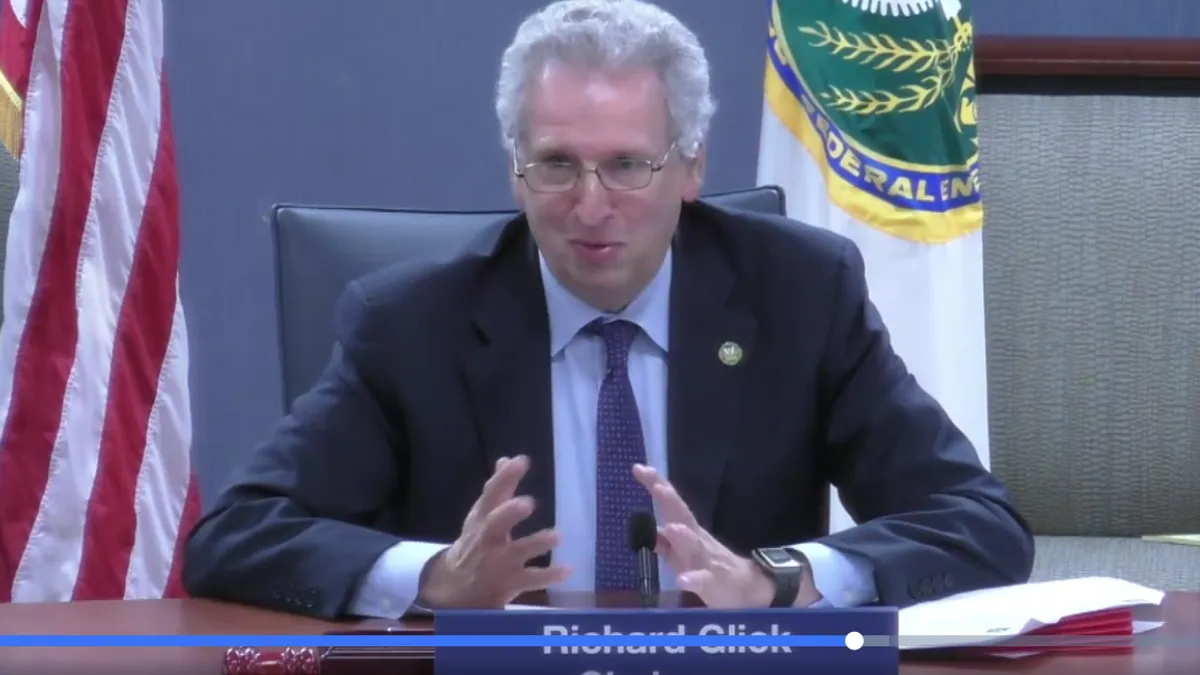Dive Brief:
-
President Joe Biden said Friday he plans to nominate Federal Energy Regulatory Commission Chairman Richard Glick to a second five-year term, giving Glick more time to carry out his ambitious agenda at the agency.
-
Since becoming FERC chairman in January 2021, Glick has started the process of overhauling the agency’s rules for transmission planning and generation interconnection, sought to revise the criteria the commission uses when reviewing proposed natural gas infrastructure, and oversaw staff in their ongoing reviews of compliance plans from grid operators for incorporating distributed energy resources into wholesale markets.
-
Looking ahead to a Senate confirmation hearing, Glick has a “good story to tell” on the agency’s bipartisan proposal to revise its transmission planning and cost allocation rules, but will likely face “significant” questions over the commission’s plans to change its gas pipeline and liquefied natural gas review process, according to Neil Chatterjee, Hogan Lovells senior advisor and former FERC chairman.
Dive Insight:
A second term for Glick would give FERC consistency as the agency works to maintain grid reliability during the transition towards clean energy resources, according to former commission leaders.
“FERC will benefit from Chairman Glick’s continued strong and engaged leadership, especially on ongoing efforts like the electric transmission rulemaking,” Cheryl LaFleur, a non-resident fellow at Columbia University's Center on Global Energy Policy and former FERC chairman, said in an email Monday. “His timely nomination will also help assure that FERC has a full complement of commissioners to address these important issues.”
The continuity in FERC leadership helps because “the chairman really does drive the policy across the agency,” Jon Wellinghoff, former FERC chairman, said Monday. “I'm looking at it as a very positive thing for FERC and a very positive thing for continuing to progress in evolving energy regulation.”
One of Glick’s top challenges, if confirmed, will be focusing FERC’s resources, according to Wellinghoff. “I know that transmission has sort of been sucking the air out of the room, but I think it really is time for the commission to turn to the distributed side, and really look at how those distributed resources can really be part of the solution … of reducing the need for new transmission and in some instances increasing reliability,” said Wellinghoff, chief regulatory officer for Voltus, a DER aggregation company.
Glick, a former Senate aide, joined FERC in late 2017 after being nominated by then-President Donald Trump.
While on the commission, Glick has opposed grid operator “minimum offer price rules,” saying they interfere with state energy policies, pressed for a more thorough accounting of how natural gas projects may affect the climate, and worked with Chatterjee to open wholesale power markets to DERs.
In perhaps the most controversial move during Glick’s time as agency head, FERC in mid-February adopted on a 3-2 vote a new framework for reviewing natural gas infrastructure proposals that included expanded criteria for deciding whether the facilities are needed. FERC also issued an interim policy statement outlining how the agency will consider greenhouse gas emissions related to the gas projects it reviews.
The Senate Energy and Natural Resources Committee, which will need to confirm Glick once he is nominated, held a hearing on the review policy, with Committee Chairman Joe Manchin, D-W.Va., and others saying the change would hurt pipeline development. Several weeks later, FERC put the policy on hold while it sought additional public comments on it.
Since then, FERC has approved nine major gas projects, but there is still uncertainty around what a future review process will look like, according to Chatterjee, a former energy advisor to Senate Minority Leader Mitch McConnell, R-Ky.
“I think [Glick’s] likely to get some pretty significant questions from Republicans on the Energy and Natural Resources Committee, as well as from Chairman Manchin, on the path forward on pipelines, and that's likely to be the thorniest part of his [confirmation] process,” Chatterjee said Monday.
Manchin had no comment on Glick’s nomination, according to Sam Runyon, Manchin’s communications director.
Looking ahead, Glick’s nomination process could be affected by rising energy costs, an unexpected reliability crisis or a change in party control of the Senate, according to Chatterjee. “[Confirmations] are not static things,” he said.
FERC commissioners Mark Christie and Willie Phillips appear to be forming a core among the agency's five commissioners, and could be key to emerging policies at the agency, Chatterjee said.
“I think those two may in many ways determine what the path forward would be for a second-term Glick chairmanship. He's got to have three votes,” Chatterjee said. “If they stick together, they could really dictate how the commission moves forward on some of the key issues of the day."














